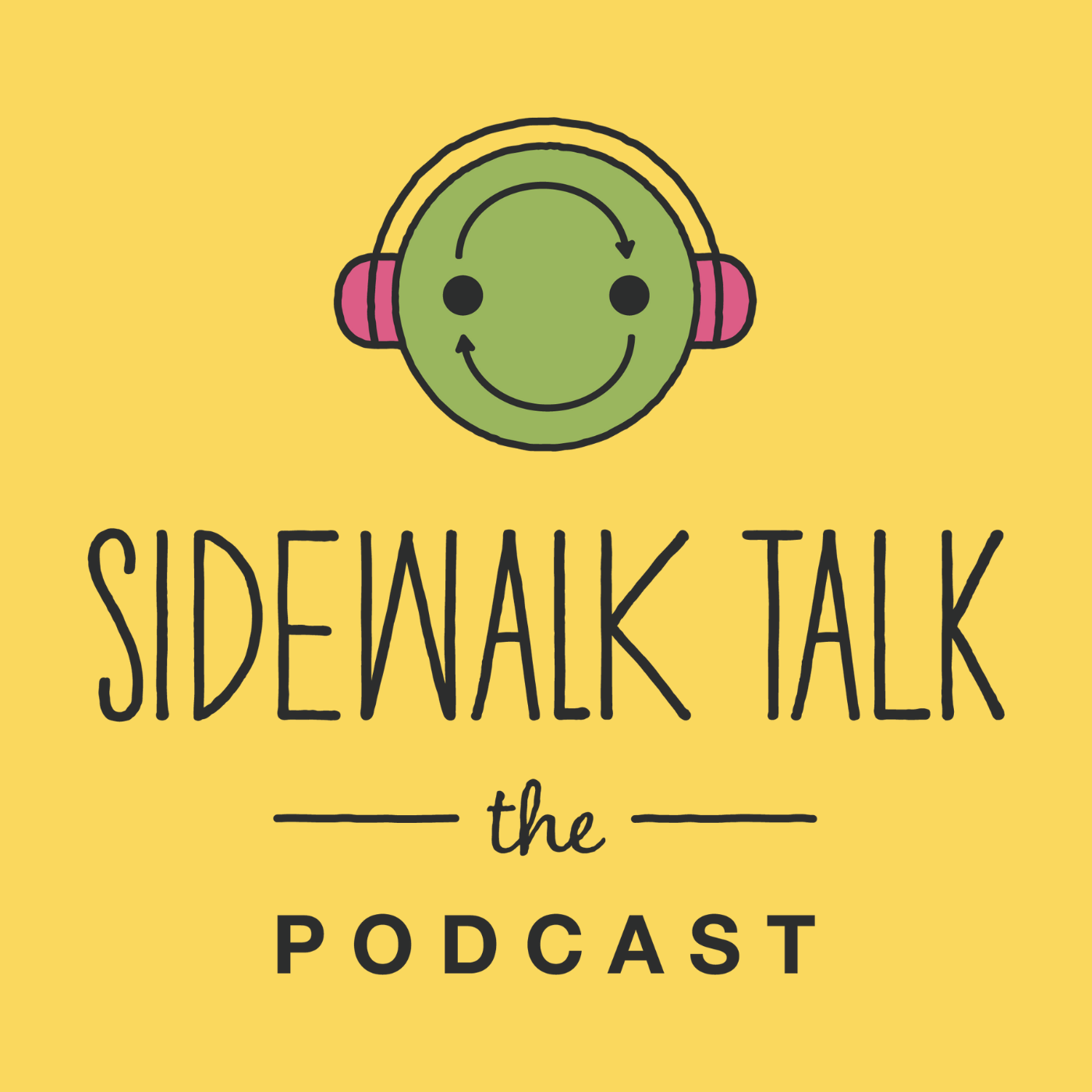
In a world that loves to talk, do, achieve, promote, preach, sell....what does it mean to connect, be, and listen. A podcast about #humanconnection #mentalhealth #socialhealth #empathy #belonging and #loneliness. And always thinking about justice and inclusion in all things. Join us. And share far and wide. Or start your own chapter of Sidewalk Talk in your community. www.sidewalk-talk.org
Episodes
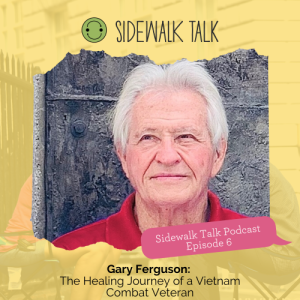
Saturday Nov 09, 2019
The Healing Journey of a Vietnam Combat Veteran
Saturday Nov 09, 2019
Saturday Nov 09, 2019
Stand Out Quotes
- Once you label someone with a disorder you create a greater sense of aloneness. I have relabeled PTSD to stand for Past Trauma Stated Differently.
- Veterans do not believe they are the ones that are broken, society is.
- Veterans take meaning from their mission. When you take that away from them, society does not make sense to them.
Note: There are pieces of this episode that may be triggering for current and former veterans and those who have experienced trauma. Practice self-care and open-hearted curiosity in your listening, as you hear Gary's story.
The US Veteran experience is one many of us feel heartache about. We see homeless veterans on the sidewalks or living on the streets. Seven percent of the US population are veterans. Seventy-five percent of those served during wartime. Twenty-two US Veterans die by suicide every day. 22!
Hear Gary describe his experience of healing from the trauma not only from his young life, but the wounds he took with him into the Vietnam War when he was just 19 years old.
He has been homeless three times and feels comfortable on the street, sometimes more so than with “society”. He describes a sense of freedom.
Gary pulled himself up using unconventional healing practices and now has founded a non-profit and training program for veterans. You can learn more about Gary and his work at www.agooddaytodie.com and www.pathwaysforveterans.com.
If you are a veteran, we thank you for your service. For the life-altering and reality twisting sacrifice, you have made to serve the US. We hope that by hearing Gary’s story, we can open ourselves to honor your story.
If you need extra support after hearing this episode see this great page of resources for vets struggling with suicide or homelessness or call the Veterans Crisis Line at 1-800-273-8255 #1.
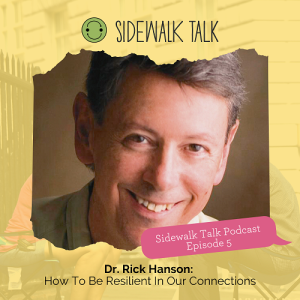
Sunday Nov 03, 2019
How To Be Resilient In Our Connections
Sunday Nov 03, 2019
Sunday Nov 03, 2019
Standout Quotes from this Episode:
In order to grow more resilient, we need to take useful experiences fully in, so they move from a shift in a state to a shift in a trait.
To enter into the depths of we, we have to have a healthy sense of me, of my own rights, autonomy, rights to disengage if I need to. Intimacy is not at odds with autonomy.
There is a real distinction between solitude and loneliness. Loneliness carries as many risks for health...
Rick Hanson, Ph.D., is a psychologist, senior fellow of the Greater Good Science Center at UC Berkeley, and New York Times best-selling author. His books are available in 26 languages and include Resilient, Hardwiring Happiness, Buddha's Brain, Just One Thing, and Mother Nurture.
Today Traci and Rick have such a sweet connection and exploration together as they discuss how to be a resilient connector even if you are an introvert. If you want to find out more about Rick please visit his website to find his podcast and online courses here which we highly get behind.
What Dr. Hanson wants us all to be able to do in this life is to show up and face challenges, experience our vulnerabilities, and use our resources more fully. One of the ways that happen is to learn how to work with ourselves to amplify useful experiences so they help us develop an unshakeable core, no matter what is happening inside or around us.
Rick talked with Traci about how to be resilient while listening on the sidewalk. And Traci got to explore with Rick where she has more work to do.
I am an introvert. I don’t need a connection.
Traci engaged Rick about the idea of introversion. She has heard from many followers of Sidewalk Talk that because they are an introvert, they do not need the kind of connection that Sidewalk Talk offers.
Rick weighs in by offering that “ I am a friendly introvert. There is a real distinction between solitude and loneliness. Loneliness carries as many risks for health as cigarette smoking. People are social animals. Certainly, in childhood, it is necessary and important for everyone to feel received in some fundamental way. John Wellwood, in his work, shared the ideology of self-reliance or spiritual bypass where we withdraw from contact bc it is stirring and we would rather preserve distance. We would prefer no demand, no obligation.”
In our modern times, we must reclaim our nature and engage people eye to eye. We are called to be strong and engage in practices that expand our ability to be free and widen our ability to experience.
When Rick asked Joseph Goldstein from the Insight Meditation Society “If you could nominate a practice for a critical mass of people to do on the planet every day what would it be?”
Joseph Goldstein said, “I would have them spend 5 minutes a day listening to another person without any judgments.”
To give others the gift and profound blessing for feeling felt.
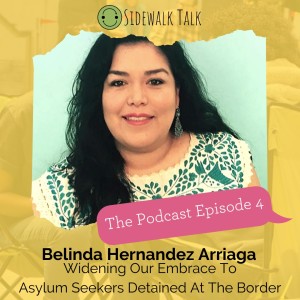
Sunday Oct 27, 2019
Sunday Oct 27, 2019
Stand Out Quotes from This Episode
Everyone has a human right to basic needs. Everyone has a right to have their family and be safe.
Basic tenants of the children’s human rights convention are that every child has a right to not be separated from their parents.
We see moms and dads and grandparents coming to save their lives. This was not their plan or desire to come to the United States but was forced to save their lives.
Belinda Hernandez Arriaga is a Faculty Coordinator for the Masters In Counseling MFT program at USF's South Bay location. Belinda has a doctorate in Education and is a Licensed Clinical Social Worker with eighteen years of experience working in community mental health, with a specialization in child trauma and Latino Mental Health. She is Founder and Chief Executive Director of Ayudando Latinos A Soñar (www.alashmb.org), a Latino cultural arts, education, and social justice program dedicated to working with rural youth and families.
Dr. Belinda Arriaga has one of the most non-judgemental loving hearts you will ever hear. She doesn’t talk politics. She empathizes with the inner political questions people have about the border crisis. But her focus is making sure moms, dads and kids are ok. This interview was recorded in 2018. Today, as it is airing on the Sidewalk Talk Podcast page, Dr. Arriaga is at the border again. She reports the conditions are worse.
She shares story after story and challenges us all to widen our embrace.
You don’t have to agree with what she is doing but I think this is a philosophical question worth asking. We have “agendas” and then we have our “humanity”. Belinda is a Christian woman and she brings her faith into the work she does. And at the end of the day, love and care for all of humanity is her heart call.
Listen as Belinda tells stories of grandmas, moms, dads, and kids trying to stay alive. You do not hear that she is a Dr. You hear she is a mother of three daughters connecting deeply with other mothers and fathers and kids. She connects through love and equality.
She gets up every day and lives this question “How can I make the world better?”
Belinda is at the border again with the University of San Francisco volunteer Bay Area Border Relief. If you want to support them right now you can send donations to VENMO @Lilli-Rey and add this text to each donation #BayAreaBorderRelief from #sidewalktalk or visit Dr. Arriagga’s website for ALAS here.
Or follow Bay Area Border Relief here for other ways to get involved.
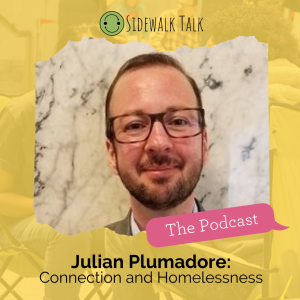
Monday Oct 21, 2019
Monday Oct 21, 2019
Standout Quotes From This Episode
- We can honor the dignity, self-determination, and support the empowerment of people who are experiencing homelessness.
- It is not the job of anyone to go out and fix people. If we think we can fix someone it means we are starting with the belief they are broken.
- Get in the habit of recognizing the difference between fear and danger or comfort and safety. Uncomfortable and socially unacceptable behaviors we may experience are off-putting but not a direct threat when listening to people on the street.
When he was a teen, Julian Plumadore was living on the streets of Seattle, Washington. His lived experience as a trans teen, experiencing homelessness, and his own twenty-year work sustaining his own mental health have created a beautiful and loving conviction to do right by people struggling with homelessness and mental health crisis. In this interview, you will learn and be inspired to take up the work of humanizing homelessness.
Police and Crisis Intervention in San Francisco
Now a trainer for MentalHealthSF.org who offers Crisis Intervention Training to newer San Francisco Police Officers and the general public, Julian has seen first-hand the impact of changing the way we think about homelessness and mental health. People who were previously wary of police, now feel supported.
If you are going to call the San Francisco Police Department for help with someone who is struggling on the street ask the following…
- We need help with a mental health crisis
- We need a Crisis Intervention Trained officer
Do You Have Any of These Stigmas About Being Homeless?
Julian and I talked about the wrong stigmas that we hold about people who are experiencing homelessness. That they are lazy, choosing this lifestyle, and somehow deserve living this way. All of which are not true and Julian's own story helps us see the larger truth. The research I quoted about our brain’s predisposition to fully not recognize as human people struggling with addiction and those experiencing homelessness can be found here.
To make a difference in the life of someone homeless, humanize them, was the big take away.
But there are things we need to get straight so we can humanize rather than objectify.
- We are not the experts on what they need and what they feel.
- We have to earn trust. Just because our intentions are good we may still be met with hostility.
- We have to have inner resilience so we can accompany someone struggling even if that means they hate what we represent in their minds.
- We have to let go of our need to be “the good person” “saving this person” and instead have real humility. Otherwise, our service is to help us feel like a good person rather than truly being of service.
- There is a real difference between our own conditioned fear and genuine danger. We have to lean into discomfort to serve folks who are on the street.
- There is very real hope for growth beyond mental illness and homelessness but we, as a community, may not see the impact of our service to this group of people. Keep going.
These are just a few of the wisdom points Julian offers but listen to the interview. You will be so overjoyed to hear Julian's story and be infused by possibility and you will come away hopeful that there are people like Julian in the world doing this work.
You can learn more about Julian’s work at mentalhealthsf.org and if there are other organizations in your part of the world that you think deserve a shout out, we would like to know about them. Post a comment with a link to their work below.
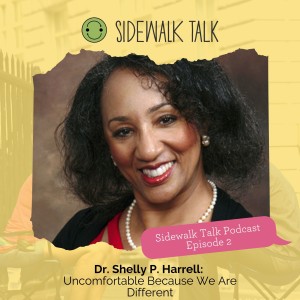
Monday Oct 14, 2019
Uncomfortable Because We Are Different with Dr. Shelly P. Harrell
Monday Oct 14, 2019
Monday Oct 14, 2019
Podcast Note: This conversation was recorded in 2018. We had some connection interruptions in a few spots. Stick with it. Good stuff here.
Standout Quotes From This Episode:
- We struggle to hold the complexity of our sameness and our difference at the same time.
- We all get anxious with difference but we must interrogate what we do with our anxiety in order to stay in connection.
- It is important we sustain engagement when it gets uncomfortable and not bail on tough conversations.
- Sidewalk Talk is an act of social justice.
Dr. Shelly Harrell is a Psychologist at Pepperdine University and a Couples Therapist.
She has built a meta transactional framework called PEaCE for interacting across differences and holding a larger context in mind. (Person-Environment-Culture - Emergence).
Dr. Harrell grew up in Detroit Michigan during the civil rights movement which shaped the lense she brings to the field of psychology.
Anxiety About Difference Is Not A Sin
We all have a physiological response to faces that are racially different than our own. It is not a sin that we have this reaction to difference. The challenge is we tend not to know how to stay with our normal discomfort.
Holding Our Human Complexity is Hard Work
One of Dr. Harrell’s favorite quotes by an anthropologist is “We are simultaneously like all others, like no others, and like some others.” She shares how we struggle to hold that complexity at the same time.
Where Connection Goes Awry
To get away from our discomfort of difference we do one of the following:
- Try to make everyone the same “we are one” or “I don’t see color”,
- Dehumanize people who are different.
- Pity or save which is a form of distancing and disconnection.
- Get “overly fascinated” by this person’s identity like they are an anthropology subject.
Dr. Harrell was excited by Sidewalk Talk and its potential to help us value interpersonal stories and show up and have a larger lense on the socio-political factors that may shape individual stories. For folks that are in the dominant culture, it would be easy to ignore individual stories. She hopes Sidewalk Talk grows beyond the sidewalk.
You can find out more about Dr. Harrell and her work at: https://www.shellyharrellphd.com
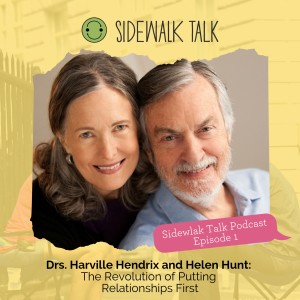
Friday Sep 27, 2019
Friday Sep 27, 2019
The Revolution of Putting Relationships First with Drs. Harville Hendricks and Helen Hunt
Standout quotes from this episode:
The outside creates the inside. -Dr. Harville Hendricks
Connecting is more important than the individual and Sidewalk Talk is creating a relationship revoluion. -Dr. Harville Hendricks
Mental health has taught us to look inside when something is wrong. No. We need to look outside. -Dr. Harville Hendricks
What makes you tired when you are listening to someone is when you have to have opinions about someone. Connecting from curiosity and wonder puts us in the most peaceful part of our brain making listening beneficial to our wellness. -Dr. Helen Hunt
Pioneers in Human Relating:
Drs. Harville Hendricks and Helen Hunt are pioneers in the field of marriage counseling and now human relationship. They are therapists turning therapy upside down. Harville has been on Oprah over 17 times, his work is that revolutionary.
For years we have been taught two things:
- Knowing, being judicious, and being certain about the world is rewarded but being “certain” about people leaves out the peace and wellness that comes from wondering and being curious about someone.
- We grow when we search inside ourselves but actually we grow when we put connection before individual introspection.
Hear how Harville and Helen talk about why listening on the sidewalk is actually good for listeners and talkers' brains.
It isn’t tiring because Sidewalk Talk Listeners are suspending the “need to know” or “the need to be right” and instead move to their upper brain, the part of the brain that creates peace and calm.
There are revolutionary takeaways in this short conversation. And we are blown away that Harville said “You know Traci, what you all are doing at Sidewalk Talk is creating a relationship revolution.”
They are convinced that we have this wellness and healing thing all wrong. It is the magic of the space between two people and making them safe and the quality of our interactions where our wellness and peace improve and thrive.
If you want to learn more about Relationships First and the Safe Conversations training we discuss in this episode, visit www.relationshipsfirst.org and we can send you verification that you are a Sidewalk Talk listener to get a discount on the training if needed.
